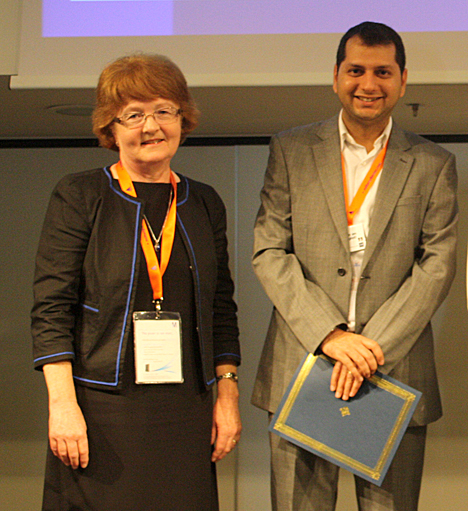Dr. Mithun Khattar, a postdoctoral researcher at The University of Toledo, has identified a molecule that could improve the lives of patients with Type I diabetes and organ transplants.

Dr. Mithun Khattar received The Journal of Immunology Young Investigator Award from Dr. Kaylene Kenyon, publication director at the editorial office of the American Association of Immunology.
Khattar, who received his PhD from UT in 2012, has been doing postdoctoral work in the Department of Medical Microbiology and Immunology since graduation. It was there he discovered that inhibiting a particular molecule caused significant improvements in immune responses to Type I diabetes and organ transplants.
He said immune responses occur in two ways — an acute response occurs spontaneously against a foreign body until it is cleared, while a chronic response is ongoing. Chronic responses occur in diseases such as HIV or Type I diabetes, and also when the body has a transplanted organ, which is what his lab focuses on.
“During transplantation, a foreign body is always there and the immune cells are constantly exposed to this foreign body,” Khattar said. “At least half of transplant recipients lose their transplants because of the persistent immune attack, also known as chronic rejection.”
Khattar’s work in the lab of Dr. Stanislaw Stepkowski, professor of medical microbiology and immunology, has identified different molecules that are associated with each immune response. They have since discovered that removing or inhibiting the molecule associated with chronic immune responses can cause significant improvements in Type I diabetes and organ transplants.
Moving forward, Khattar hopes to use this knowledge to create new therapies to replace insulin injections in patients with Type I diabetes. He also hopes to create therapies for transplant patients in the hopes of reducing the failure of transplanted organs.
The Journal of Immunology Young Investigator Award recognition for his work paid for Khattar’s travel expenses to go to the Congress of Immunology held in August in Milan, Italy, where he had the opportunity to present his work.
“To me, this means much more than just traveling,” Khattar said. “This lets people know what we do here and gives us assurance from the scientific community that we are on the right path and what we are doing is important.”